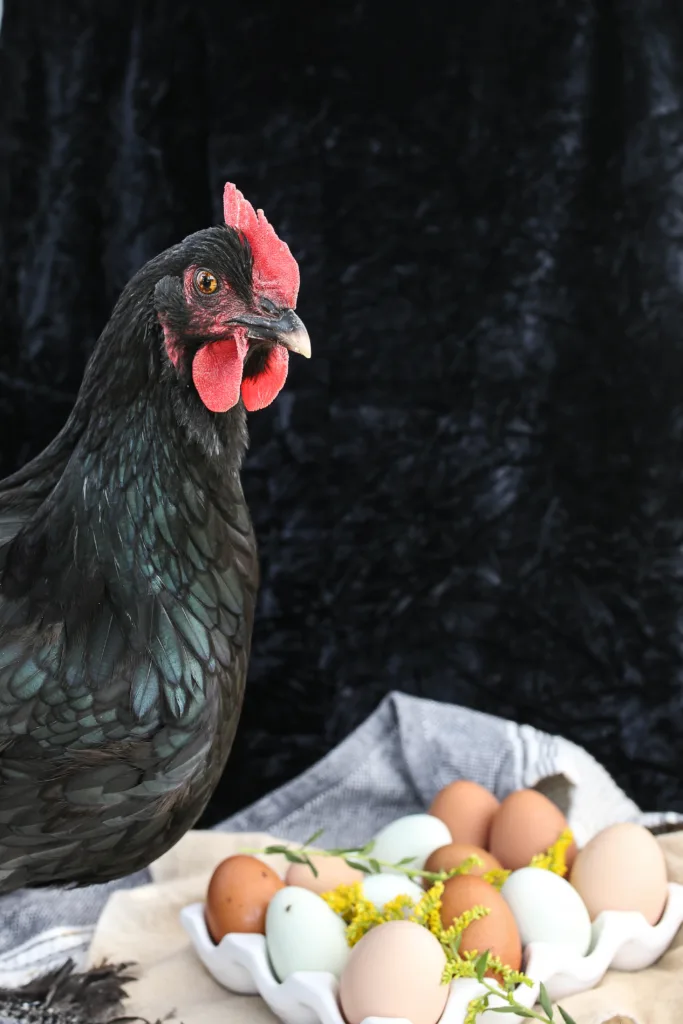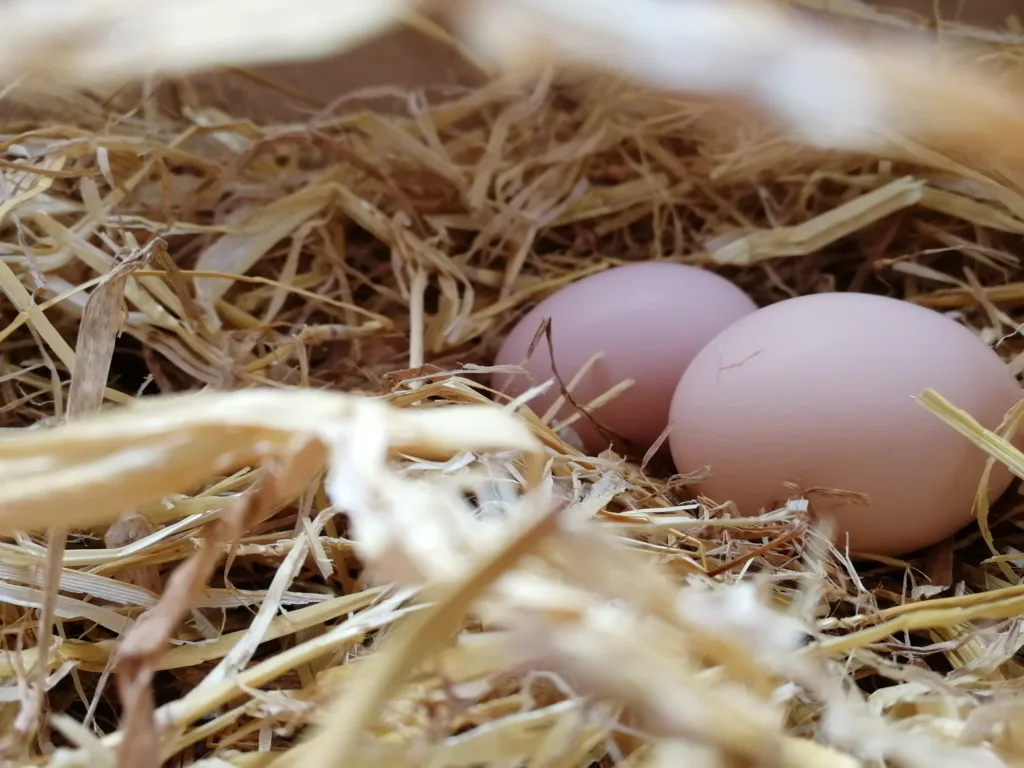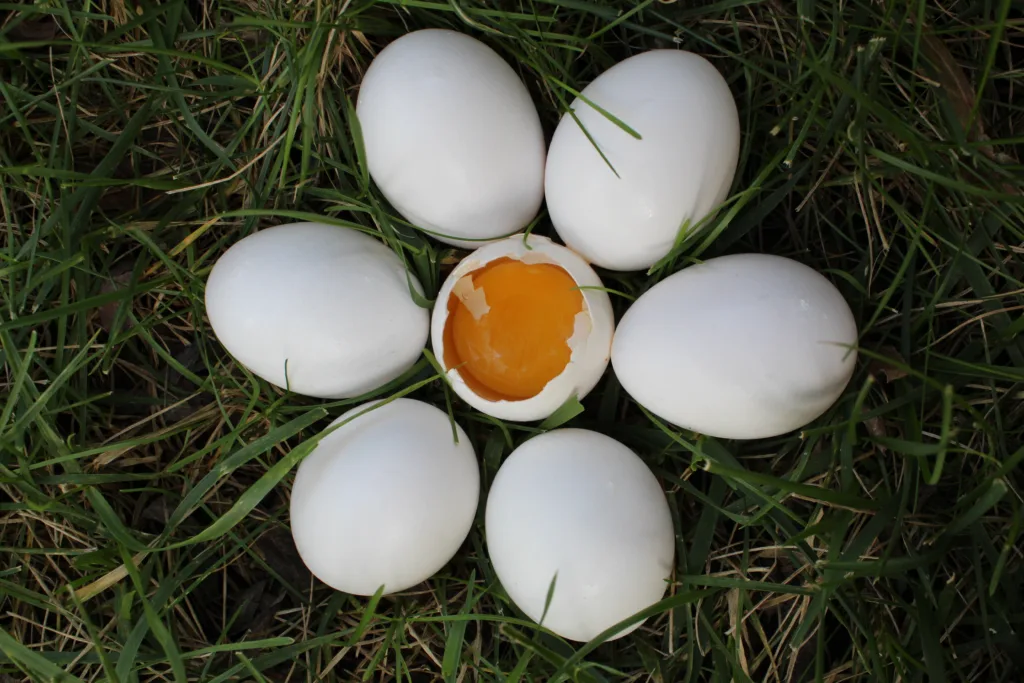Chickens are fascinating creatures that have been domesticated by humans for thousands of years. They are valued for their meat and eggs, and are also kept as pets. One of the most interesting aspects of chickens is their egg-laying process. If you’re a chicken owner or just curious about the biology of these birds, you may be wondering if a chicken’s eggshell hardens after it is laid. In this blog post, we’ll explore the answer to this question and delve into the science behind eggshell formation in chickens.
First things first, let’s talk about how a chicken’s egg is formed. A hen’s reproductive system consists of an ovary, oviduct, and cloaca. The ovary produces the yolk, which is released into the oviduct. As the yolk travels through the oviduct, it is surrounded by albumen (the egg white) and then a shell membrane. The egg then enters the shell gland, where the shell is formed over the course of about 20 hours. The shell is made up of calcium carbonate, which is secreted by cells in the shell gland. The shell hardens as it dries, and is laid by the hen through the cloaca.
Now, to answer the question at hand: does a chicken’s eggshell harden after it is laid? The short answer is no, the eggshell does not harden after it is laid. Once the egg is laid, the shell is fully formed and will not change in hardness or thickness. However, the shell can become damaged or cracked after it is laid, which can compromise its strength and integrity.
So, what factors affect the hardness of a chicken’s eggshell? One of the most important factors is the hen’s diet. Hens require a diet that is high in calcium in order to produce strong eggshells. If a hen’s diet is deficient in calcium, the eggshells may be thin or weak. This is why it’s important to provide your chickens with a balanced diet that includes calcium-rich foods like oyster shells or limestone.
Another factor that can affect eggshell hardness is temperature. If the temperature is too high (over 32°C), it can stress the hen and reduce the strength of the eggshell. Vitamin D3 deficiency can also have an impact on eggshell quality, as hens need this vitamin to properly absorb calcium from their diet.
A chicken’s eggshell does not harden after it is laid. The shell is fully formed and hardened by the time it is laid, but can become damaged or weakened due to factors like diet, temperature, and vitamin D3 deficiency. By providng your chickens with a balanced diet and a comfortable environment, you can help ensure that they produce strong, healthy eggs with sturdy shells.
Hardening of Eggs After Laying
Once a hen lays an egg, it takes roughly 20-30 minutes for the outer shell to completely form. However, it can take up to 12-24 hours for the shell to fully harden and become sturdy enough to withstand handling and transportation. During this time, the egg will absorb moisture from the surrounding environment, wich helps to strengthen the shell. Additionally, the protective coating on the shell (known as the bloom or cuticle) will dry and form a barrier that helps prevent bacteria from entering the egg. It’s important to handle eggs gently during this time to avoid cracking or damaging the delicate shell. Once the shell has fully hardened, the egg can be safely stored at room temperature or refrigerated until consumed.

Hardening Chicken Egg Shells
To harden chicken egg shells, you need to ensure that your chickens are getting enough calcium in their diet. Calcium is essential for the formation of strong egg shells. One way to provide your chickens with this necessary nutrient is to include shell grit in their diet. Shell grit is a mixture of crushed oyster shells, cockle shells, and limestone that provides a rich source of calcium. You can offer shell grit to your chickens in a separate feeder, so they can peck at it as needed. Another option is to supplement their diet with calcium-rich foods such as leafy green vegetables, dairy products, and eggshells. Crushed eggshells can be gien to your chickens in small amounts, as they are a good source of calcium and can be easily absorbed by your chickens. It is important to ensure that your chickens have access to fresh water at all times, as dehydration can also affect eggshell quality. Finally, maintaining a clean and stress-free environment for your chickens can also help to ensure that they produce strong and healthy eggshells.
The Process of Hardening a Chicken Egg
A chicken egg gets hard through a process called calcification. This process takes place in the shell gland, which is the final part of the oviduct. As the egg moves through the shell gland, layers of calcium carbonate are deposited on the surface of the egg. The calcium carbonate forms a hard outer shell that protects the egg from damage and helps to prevent bacteria from entering. This process takes approximately 20 hours to complete. Before entering the shell gland, the egg passes through the isthmus, where the shell membrane fibers are produced. Overall, the process of forming a hard egg shell is a complex and fascinating process that involves several parts of the chicken’s reproductive system working together.
The Causes of Soft Eggshells in Chickens
Soft egg shells in chickens can be caused by a number of factors. One possible reason is that the hens may have started laying eggs before they were provided with a good quality layer diet. This can quickly deplete their calcium reserves, whih are crucial for forming strong egg shells. Another factor that can contribute to soft egg shells is high temperatures. When the temperature rises above 32°C, it can cause stress in the hens and reduce the strength of their egg shells. Additionally, a deficiency in vitamin D3 can also lead to soft egg shells. Hens need a commercial source of vitamin D3 in their feed to ensure that they are able to properly absorb calcium and produce strong egg shells. By addressing these factors and ensuring that your hens have access to a balanced and nutritious diet, you can help to prevent soft egg shells and promote healthy egg production.
Are Newly Laid Egg Shells Soft?
Yes, egg shells can be soft when they are first laid. This is particularly common in young layers who are just starting to lay eggs. As their reproductive systems develop and mature, the quality and consistency of their egg shells should improve. However, there are also other factors that can contribute to soft-shelled eggs, including poor nutrition, stress, disease, or a lack of calcium in the hen’s diet. It’s important to proide your chickens with a balanced diet and access to clean water and a calcium supplement, like crushed oyster shells, to help ensure that their egg shells are strong and healthy. If you notice persistent issues with soft-shelled eggs, it’s a good idea to consult with a veterinarian to identify any underlying health concerns.

The Hardness of Egg Shells When First Laid
No, egg shells are not hard when first laid. When a chicken lays an egg, the shell material is secreted inside the oviduct as the egg passes along on its way to being laid. This shell material is deposited around the egg and begins to harden before the egg is laid. The hardening process continues outside of the chicken’s body until the shell is completely formed and hardened. So, while the egg shell is not hard when it is first laid, it begins to harden quickly and is fully formed by the time the egg is laid.
How Long Does It Take for a Chicken Egg Shell to Harden?
When a chicken lays an egg, the shell is initially soft and pliable. However, over the course of about 20 hours, the shell gradually hardens as it travels through the hen’s reproductive tract. During this time, the shell is coated with a layer of calcium carbonate, wich gives it its hard, protective exterior. This process is essential for ensuring that the egg is able to withstand the pressures of incubation and protect the developing embryo inside. Once the shell has fully hardened, the egg is ready to be laid, and the hen will typically lay one egg per day. So, to answer the question, it takes about 20 hours for a chicken egg shell to harden.
Does Vinegar Harden Egg Shells?
No, in fact, vinegar has the opposite effect on eggshells. Eggshells are made of calcium carbonate, which is a base. When vinegar, which is an acid, is added to the eggshell, it reacts with the calcium carbonate and breaks it down, resulting in the eggshell softening and even dissolving over time. Therefore, vinegar does not harden eggshells, but rather, it can weaken and dissolve them.
The Hardening of Chicken Eggs
Chicken eggs are hardened by a combination of two essential nutrients: calcium and vitamin D3. Calcium is the primary building block of eggshells and is critical for the development of strong and healthy shells. Without sufficient calcium, eggshells can becme thin and brittle, making them more susceptible to cracking and breaking. Vitamin D3, on the other hand, plays a vital role in the absorption of calcium from the chicken’s diet and its transportation to the developing eggshell. When a hen consumes calcium-rich foods and has adequate levels of vitamin D3, the calcium is deposited in the eggshell, resulting in a hard and durable shell. Therefore, the presence of both calcium and vitamin D3 is crucial for the production of high-quality eggs with strong and healthy shells.

The Hardness of Eggshells
Eggshells are hard because they consist of both inorganic and organic matter. They contain minerals that are rich in calcium and a variety of proteins. However, the remarkable strength of eggshells comes from a nanostructured mineral that is associated with a protein called osteopontin. This protein is also found in composite biological materials such as our bones. The combination of the mineral and the protein creates a unique structure that provides excellent strength and durability. Additionally, the thickness of the eggshell also contributes to its hardness. The eggshell is composed of sevral layers, each with a specific purpose, such as providing protection and regulating moisture. Overall, the combination of the mineral, protein, and layered structure of the eggshell make it one of the strongest natural materials known to man.
Troubleshooting Stiffness Issues with Eggs
If your egg whites aren’t gettig stiff, there could be a few reasons why. First, it’s important to make sure that there is no yolk in the whites, as even a small amount of yolk can prevent the whites from whipping properly. Additionally, make sure that your bowl and beaters are completely clean and dry, as any grease or residue can also hinder the process.
Another factor to consider is the temperature of the egg whites. They should be at room temperature before you begin whipping them, as cold whites won’t expand as much and will take longer to whip. You can bring the whites to room temperature by letting them sit out for about 30 minutes before you start.
Finally, if you’re using an electric mixer, make sure that you’re using the right speed and technique. Start on low speed and gradually increase as the whites begin to froth. Once they start to form soft peaks, increase the speed to high and continue beating until you get stiff peaks that hold their shape. If you overbeat the whites, they can become grainy and dry, so be sure to stop as soon as they reach the desired consistency. By following these tips, you should be able to get your egg whites to whip up perfectly every time!
The Mystery of the Soft-Shelled Chicken Egg
When a chicken lays an egg without a hard shell, it is typically due to a condition called “soft-shelled eggs” or “shell-less eggs”. This condition occurs when the egg is laid without a complete or fully-formed shell. Instead, the egg is encased by a thin, membrane-like layer that is easily broken or damaged.
Soft-shelled eggs are most commonly caused by a lack of calcium in the hen’s diet. Calcium is an essential nutrient for egg production, as it is a key component of the eggshell. When a hen’s diet is deficient in calcium, her body will prioritize using the available calcium to maintain core bodily functions, such as muscle and nerve function, over producing a strong eggshell. As a result, the eggshell may be thin or incomplete.
Other factors that can contribute to soft-shelled eggs include stress, illness, or genetic factors. If your chicken is consistently laying eggs without a hard shell, it may be necssary to adjust her diet or seek veterinary care to address any underlying health conditions. Providing your chickens with a balanced diet that is rich in calcium, along with a clean and stress-free environment, can help to prevent soft-shelled eggs and ensure the health and productivity of your flock.
Conclusion
In conclusion, chickens are fascinating creatures that provide us with a valuable source of food. Understanding their reproductive and dietary needs is essential for maintaining their health and ensuring the production of high-quality eggs. Providing them with a balanced diet that includes shell grit and vitamin D3, as well as keeping them in a comfortable environment, can help to maintain the strength and quality of their shells. By taking care of our chickens, we can ensure a steady supply of fresh and nutritious eggs for our households.
